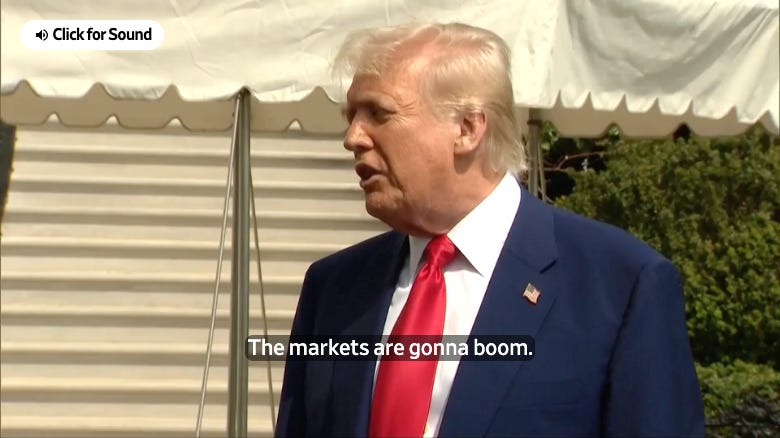Today's News: New Tariffs Trigger Global Market Selloff
President Trump’s sweeping new tariffs on nearly all U.S. imports triggered the largest one-day drop in global stock markets since the pandemic and sparked warnings of a global recession.
Photo: Photo: Charly Triballeau/AFP/Getty Images
Overview
Date: April 2–3, 2025
Topic: Trump’s New Tariffs Trigger Global Market Selloff and Economic Uncertainty
Summary: President Donald Trump’s sweeping new tariffs on nearly all U.S. imports have triggered the largest one-day drop in global stock markets since the pandemic, erased trillions in market value, and sparked warnings of a global recession. With a 10% baseline tariff and additional “reciprocal” tariffs ranging from 1% to 46% on goods from 57 countries, including key allies, the policy drew swift international criticism and retaliatory threats. Trump defended the tariffs as necessary to bring manufacturing back to the U.S., though analysts predict higher consumer prices, disrupted supply chains, layoffs, and a severe drag on global growth.
Sources
The New York Times – Live Updates: Tariffs Send Wall Street Tumbling to Worst Day Since Pandemic
CNN – Stocks plunge as Trump’s tariffs spark global trade war
NBC News – U.S. stocks take a historic plunge after Trump's tariffs shock global trade
The Washington Post – Trump tariffs ripple across the globe; Wall Street sees biggest plunge since 2020
Wall Street Journal – White House increases China tariffs, also levies big charges on EU, Japan and other trading partners
Fox Business – Stocks tumble after Trump’s tariffs roil global markets: Live Updates
Key Points
Trump imposed a 10% baseline tariff on nearly all imports and additional reciprocal tariffs (up to 46%) targeting 57 countries based on trade deficits.
Global markets plummeted, with the S&P 500 falling nearly 5%, the Dow over 1,600 points, and the Nasdaq almost 6%.
Economists warn of higher prices for consumer goods, a possible recession, and disrupted global supply chains.
Trump and advisers argue tariffs will revitalize U.S. manufacturing and reduce trade imbalances.
Major trading partners, including China, the EU, and Canada, have threatened or initiated retaliation.
The hardest-hit market sectors include tech, energy, autos, and retail; oil prices and the dollar also declined.
Unique Highlights
The New York Times detailed early consumer impacts, especially in grocery and specialty food sectors, with tariffs on shrimp, coffee, and monkfruit purée. It also covered challenges for small food businesses navigating new costs.
CNN reported that the White House may use tariffs as a bargaining chip, citing openness to deals, including a potential TikTok negotiation with China. It also cited the Tax Foundation’s $2,100-per-household cost estimate.
NBC News emphasized the impact on retail and oil drillers and questioned the rationale behind using trade deficits to determine tariff levels.
The Washington Post noted layoffs and production halts at Stellantis plants and reported criticism from world leaders, including Macron and von der Leyen. It also highlighted Biden-era geopolitical concerns at NATO.
The Wall Street Journal included details on currency market reactions, gold movements, and a list of tariff exemptions worth $644 billion. It also noted tariff impacts on the aerospace and auto sectors.
Fox Business included the CPI time frame for price increases, sectoral stock breakdowns, and Ford's marketing campaign touting domestic production in response to tariffs.
Contrasting Details
CNN emphasized Trump’s flexibility on deals and portrayed tariffs as potential negotiation tools, while The Washington Post and The Wall Street Journal presented them as fixed policy shifts with high stakes and likely permanence.
The New York Times and CNN highlighted consumer price impacts with detailed examples; NBC News and The Wall Street Journal focused more on market mechanics and corporate consequences.
While Fox Business took a more neutral tone, suggesting domestic firms may benefit, The Washington Post and NBC News framed the tariffs as economically reckless and inflationary.
CNN quoted Peter Navarro denying that consumers will bear costs, contradicting the consensus from other sources predicting widespread price increases.
The Newsie Project is an experiment using AI tools to survey contemporary reporting. It attempts to summarize, compare, and contrast the reporting of the major US online news sources.
This is an evolving project. Tools, approaches, and output formats will change over time. The Newsie Project does not attempt to provide a definitive capsule of any news story. While the incidence of errors in these summaries is low, and I attempt to spot-check details, AI tools can hallucinate. Please click through and read the articles for details (some may be paywalled).


